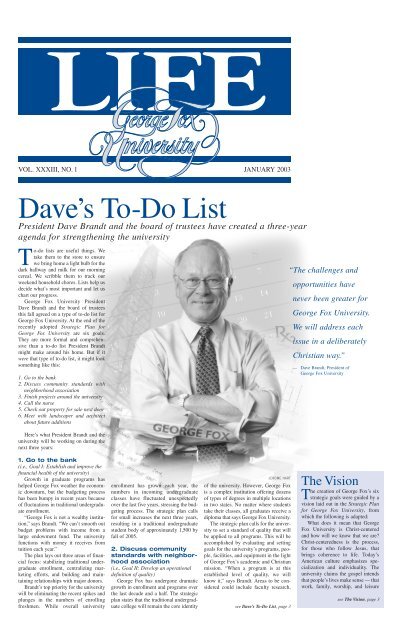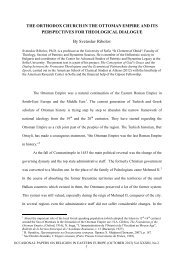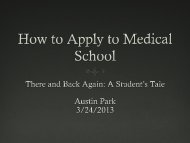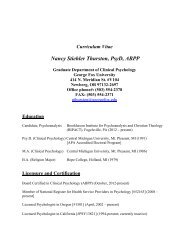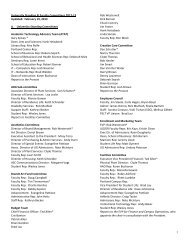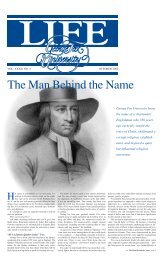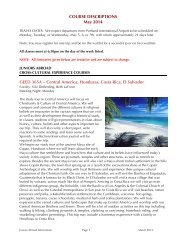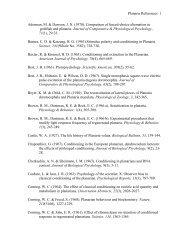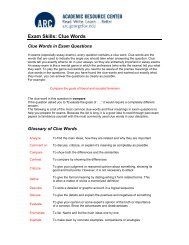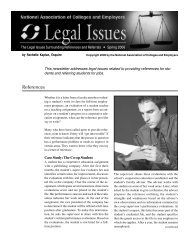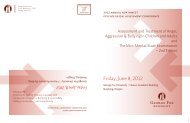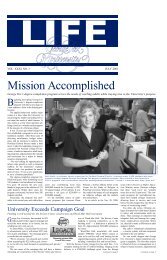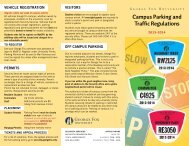LIFE Vol 33, No 1 - George Fox University
LIFE Vol 33, No 1 - George Fox University
LIFE Vol 33, No 1 - George Fox University
Create successful ePaper yourself
Turn your PDF publications into a flip-book with our unique Google optimized e-Paper software.
<strong>Vol</strong> <strong>33</strong> <strong>No</strong> 1 12/20/02 3:31 PM Page 1<br />
<strong>LIFE</strong><br />
VOL. XXXIII, NO. 1 JANUARY 2003<br />
Dave’s To-Do List<br />
President Dave Brandt and the board of trustees have created a three-year<br />
agenda for strengthening the university<br />
To-do lists are useful things. We<br />
take them to the store to ensure<br />
we bring home a light bulb for the<br />
dark hallway and milk for our morning<br />
cereal. We scribble them to track our<br />
weekend household chores. Lists help us<br />
decide what’s most important and let us<br />
chart our progress.<br />
<strong>George</strong> <strong>Fox</strong> <strong>University</strong> President<br />
Dave Brandt and the board of trustees<br />
this fall agreed on a type of to-do list for<br />
<strong>George</strong> <strong>Fox</strong> <strong>University</strong>. At the end of the<br />
recently adopted Strategic Plan for<br />
<strong>George</strong> <strong>Fox</strong> <strong>University</strong> are six goals.<br />
They are more formal and comprehensive<br />
than a to-do list President Brandt<br />
might make around his home. But if it<br />
were that type of to-do list, it might look<br />
something like this:<br />
1. Go to the bank<br />
2. Discuss community standards with<br />
neighborhood association<br />
3. Finish projects around the university<br />
4. Call the nurse<br />
5. Check out property for sale next door<br />
6. Meet with landscaper and architect<br />
about future additions<br />
“The challenges and<br />
opportunities have<br />
never been greater for<br />
<strong>George</strong> <strong>Fox</strong> <strong>University</strong>.<br />
We will address each<br />
issue in a deliberately<br />
Christian way.”<br />
— Dave Brandt, President of<br />
<strong>George</strong> <strong>Fox</strong> <strong>University</strong><br />
Here’s what President Brandt and the<br />
university will be working on during the<br />
next three years:<br />
1. Go to the bank<br />
(i.e., Goal I: Establish and improve the<br />
financial health of the university)<br />
Growth in graduate programs has<br />
helped <strong>George</strong> <strong>Fox</strong> weather the economic<br />
downturn, but the budgeting process<br />
has been bumpy in recent years because<br />
of fluctuations in traditional undergraduate<br />
enrollment.<br />
“<strong>George</strong> <strong>Fox</strong> is not a wealthy institution,”<br />
says Brandt. “We can’t smooth out<br />
budget problems with income from a<br />
large endowment fund. The university<br />
functions with money it receives from<br />
tuition each year.”<br />
The plan lays out three areas of financial<br />
focus: stabilizing traditional undergraduate<br />
enrollment, centralizing marketing<br />
efforts, and building and maintaining<br />
relationships with major donors.<br />
Brandt’s top priority for the university<br />
will be eliminating the recent spikes and<br />
plunges in the numbers of enrolling<br />
freshmen. While overall university<br />
enrollment has grown each year, the<br />
numbers in incoming undergraduate<br />
classes have fluctuated unexpectedly<br />
over the last five years, stressing the budgeting<br />
process. The strategic plan calls<br />
for small increases the next three years,<br />
resulting in a traditional undergraduate<br />
student body of approximately 1,500 by<br />
fall of 2005.<br />
2. Discuss community<br />
standards with neighborhood<br />
association<br />
(i.e., Goal II: Develop an operational<br />
definition of quality)<br />
<strong>George</strong> <strong>Fox</strong> has undergone dramatic<br />
growth in enrollment and programs over<br />
the last decade and a half. The strategic<br />
plan states that the traditional undergraduate<br />
college will remain the core identity<br />
JEROME HART<br />
of the university. However, <strong>George</strong> <strong>Fox</strong><br />
is a complex institution offering dozens<br />
of types of degrees in multiple locations<br />
in two states. <strong>No</strong> matter where students<br />
take their classes, all graduates receive a<br />
diploma that says <strong>George</strong> <strong>Fox</strong> <strong>University</strong>.<br />
The strategic plan calls for the university<br />
to set a standard of quality that will<br />
be applied to all programs. This will be<br />
accomplished by evaluating and setting<br />
goals for the university’s programs, people,<br />
facilities, and equipment in the light<br />
of <strong>George</strong> <strong>Fox</strong>’s academic and Christian<br />
mission. “When a program is at this<br />
established level of quality, we will<br />
know it,” says Brandt. Areas to be considered<br />
could include faculty research,<br />
see Dave’s To-Do List, page 3<br />
The Vision<br />
The creation of <strong>George</strong> <strong>Fox</strong>’s six<br />
strategic goals were guided by a<br />
vision laid out in the Strategic Plan<br />
for <strong>George</strong> <strong>Fox</strong> <strong>University</strong>, from<br />
which the following is adapted:<br />
What does it mean that <strong>George</strong><br />
<strong>Fox</strong> <strong>University</strong> is Christ-centered<br />
and how will we know that we are?<br />
Christ-centeredness is the process,<br />
for those who follow Jesus, that<br />
brings coherence to life. Today’s<br />
American culture emphasizes specialization<br />
and individuality. The<br />
university claims the gospel intends<br />
that people’s lives make sense — that<br />
work, family, worship, and leisure<br />
see The Vision, page 3
<strong>Vol</strong> <strong>33</strong> <strong>No</strong> 1 12/20/02 3:31 PM Page 2<br />
2<br />
<strong>George</strong> <strong>Fox</strong> Graduate Dies in Terrorist Bombing in Bali<br />
She believed “all plaids match.” She<br />
loved to travel, the color purple,<br />
and cheesecake. She wanted to be a<br />
professional photographer. She was also<br />
<strong>George</strong> <strong>Fox</strong>’s first victim of terrorism.<br />
Megan Heffernan, 28, was among<br />
more than 180 people killed in a terrorist<br />
bombing in Bali, Indonesia, Oct. 12.<br />
The 1996 <strong>George</strong> <strong>Fox</strong> graduate, who<br />
had been teaching<br />
English at a college<br />
in Korea, was<br />
on a brief holiday<br />
with four friends<br />
at Bali’s Kuta<br />
Beach. After scuba<br />
diving during the<br />
day, the two men<br />
Megan Heffernan<br />
in the group went<br />
back to their hotel,<br />
while Heffernan and two girlfriends went<br />
to a shopping area near where the blasts<br />
occurred. All three were killed, although<br />
it was three weeks before Heffernan was<br />
identified. Her body was returned to her<br />
hometown of Eagle River, Alaska.<br />
A memorial service was held <strong>No</strong>v. 23<br />
at <strong>George</strong> <strong>Fox</strong>, where Heffernan’s<br />
friends gathered to pay tribute to her free<br />
spirit and struggled to make sense of her<br />
death. As they reminisced, a portrait<br />
emerged of a young woman who was<br />
cheerful, daring, fun, a little eccentric,<br />
and a devout Christian.<br />
Her friends laughed as they recalled<br />
her practical jokes, such as the time she<br />
sent a gift set of Spam to a friend in<br />
America. They remembered her love of<br />
learning that spurred her to read nonfiction<br />
books and take an afternoon language<br />
class while on vacation in Thailand.<br />
They marveled at her sense of<br />
adventure that saw her try skydiving,<br />
earn a black belt in Hapkido, and scuba<br />
dive without a license.<br />
As a friend in Korea wrote in a Web<br />
site tribute to Heffernan, “If you were<br />
planning a trip to Jindo Island [Korea],<br />
Megan was game. Thinking about mountain<br />
climbing? Megan was interested.<br />
Going rock climbing? Megan wanted to<br />
try it. She lived her life actively seeking<br />
new experiences, and preferably, she<br />
wanted to take her camera with her.”<br />
This same friend recalled the first time<br />
she met Heffernan shortly after arriving<br />
in South Korea: “I crashed her birthday<br />
party and discovered that she was friends<br />
with just about everyone. She was friendly,<br />
interesting, and articulate. When she<br />
later hosted a party at her house, so many<br />
people came that there was no place to<br />
sit. Yet she made everyone feel welcome.”<br />
It was Heffernan’s ability to connect<br />
with others that was the source of her<br />
wanderlust, according to Gregg Lamm,<br />
<strong>George</strong> <strong>Fox</strong> <strong>University</strong>’s campus pastor.<br />
“She loved to travel,” he says. “Some<br />
people travel for the experiences, but she<br />
traveled to meet people.”<br />
And wherever she went, she had her<br />
camera.<br />
Heffernan’s father says she was saving<br />
money to go to photography school<br />
in Paris or London. The day before she<br />
Heffernan with “The Soul Trolley,” her wildly painted<br />
car with a leaky roof and broken windshield wipers.<br />
left for Bali, she told a friend, “I have to<br />
become a photographer. It’s just too fun.”<br />
She had spent the previous weekend taking<br />
pictures at a mask festival, and in<br />
“classic Megan form,” leaped up on the<br />
stage reserved for professional photographers<br />
and shot 10 rolls of film. Upon her<br />
return from Bali, she planned to visit airline<br />
magazine offices and show them her<br />
portfolio.<br />
<strong>No</strong>w that such dreams will never be<br />
fulfilled, those who loved Heffernan are<br />
left to grapple with how God wants them<br />
to respond to the loss of their friend.<br />
Lanette Smith, a former college roommate<br />
of Heffernan, tells how she found<br />
herself moved to tears as God led her to<br />
pray for the terrorists after the Bali attack<br />
— and how she learned three days later<br />
that her friend was missing as a result of<br />
the bombings.<br />
“God, you knew,” Smith recalls saying<br />
to the Lord. “You were<br />
preparing me personally<br />
through my prayer time to<br />
have compassion for these<br />
people.”<br />
Chris Benham relates a<br />
conversation he had with<br />
his 4-year-old daughter,<br />
Naomi, to whom he’d<br />
been explaining the realities<br />
of life and death. He<br />
and his wife, Charity, both<br />
<strong>George</strong> <strong>Fox</strong> graduates,<br />
taught English in South<br />
Korea with Heffernan.<br />
As Naomi was taking a<br />
bath one evening, she announced to her<br />
father:<br />
“I love everybody, even strangers, but<br />
I’m kind of mad at them.”<br />
“Why are you mad at strangers?”<br />
Benham asked her.<br />
“Because they made Mommy’s friend<br />
die.”<br />
“But you still love them?”<br />
“Yeah,” the child replied, “because<br />
Jesus said we should love everybody.”<br />
And that, Benham told Megan’s<br />
friends at her memorial service, is what<br />
God calls his followers to do.<br />
— Anita Cirulis<br />
Tributes to Heffernan, along with some<br />
of her photographs, have been posted to<br />
a Web site by her students at Pusan <strong>University</strong>:<br />
www.pusanweb.com/community/<br />
memorial.htm<br />
<strong>LIFE</strong> STAFF<br />
Editor<br />
Anita Cirulis<br />
Contributing Writers<br />
Blair Cash<br />
Anita Cirulis<br />
Rob Felton<br />
Barry Hubbell<br />
Photographers<br />
Anita Cirulis<br />
Jerome Hart<br />
Kirk Hirota<br />
Designer<br />
Colin Miller<br />
<strong>George</strong> <strong>Fox</strong> <strong>University</strong> <strong>LIFE</strong> (USPS 859-<br />
820) is published four times a year by<br />
<strong>George</strong> <strong>Fox</strong> <strong>University</strong>, 414 N. Meridian<br />
St., Newberg, OR, 97132-2697, USA.<br />
Periodicals postage paid at Newberg,<br />
Oregon. Postmaster: Send address<br />
changes to <strong>LIFE</strong>, <strong>George</strong> <strong>Fox</strong> <strong>University</strong>,<br />
414 N. Meridian St. #6069, Newberg, OR<br />
97132-2697.<br />
Please send letters, alumni news, and<br />
address changes to <strong>LIFE</strong>, <strong>George</strong> <strong>Fox</strong><br />
<strong>University</strong>, 414 N. Meridian St. #6069,<br />
Newberg, OR 97132-2697.<br />
Phone: 503-554-2126. Use our<br />
Web site: www.georgefox.edu/alumni,<br />
and click “Send Us Your News.”<br />
E-mail: alumni@georgefox.edu.<br />
GEORGE FOX UNIVERSITY<br />
ADMINISTRATION<br />
President<br />
H. David Brandt<br />
Provost<br />
Robin E. Baker<br />
Vice President for Marketing and<br />
Advancement<br />
Dana L. Miller<br />
Vice President for Financial Affairs<br />
G. Michael Goins<br />
Vice President for Student Life<br />
Bradley A. Lau<br />
Executive Assistant to the President<br />
Barry A. Hubbell<br />
Dave’s Mission Statement<br />
Acompleted institutional strategic plan seldom reflects<br />
the time, energy, and assumptions necessary to create<br />
the finished product. The <strong>George</strong> <strong>Fox</strong> <strong>University</strong> plan<br />
reported in this issue of Life has been several years in the<br />
making, with input from employees, students, alumni, and<br />
the university board. But what are the basic principles and<br />
the “drivers” behind this plan?<br />
Plans are forward-looking and articulate change that<br />
will take place. One of the most important features of a<br />
plan, however, is that it be clear about what must not and<br />
cannot change. This list of “don’t you dare touch” has to be<br />
clear and short. If the list is long, change becomes difficult.<br />
If the list is unclear, essentials can be lost.<br />
The new strategic plan for <strong>George</strong> <strong>Fox</strong> <strong>University</strong> is<br />
very clear that we will continue to be a Christ-centered university<br />
working within our historic mission to “demonstrate<br />
the meaning of Jesus Christ by offering a caring educational<br />
community in which each individual may achieve<br />
the highest intellectual and personal growth, and by participating<br />
responsibly in our world’s concerns.” We look for<br />
change within, not outside, our mission.<br />
Because of the rapidity of change in our society, it is<br />
more important than ever to articulate the long-term values<br />
and principles of the institution. We tend to respond more<br />
strongly and more quickly to events that are recent and<br />
local. In order not to overreact, we must make sure that<br />
long-term principles are present and clearly stated.<br />
Another reason to keep the long-term clearly in view is<br />
that we must not forget goals that are very important, but<br />
not quickly attainable. For example, <strong>George</strong> <strong>Fox</strong> <strong>University</strong><br />
needs to increase its endowment fund, but endowment<br />
funds grow relatively slowly. This goal must always be<br />
kept alive, even though it will take time to achieve an<br />
appropriate level of endowment funding.<br />
The converse of the importance of long-term goals is<br />
not to sell out the present for the sake of the future. We<br />
must serve today’s students to the very best of our ability.<br />
Because of the rapidity of change, long-term is shorter than<br />
it used to be. I hope the goals of our new strategic plan will<br />
President<br />
David Brandt<br />
be accomplished within several years so they will affect<br />
and benefit the current university. This means that we must<br />
both address current needs and seek stability for the future.<br />
The fun part of planning is the<br />
goals that add programs and facilities.<br />
The harder aspect is that<br />
good planning needs to consider<br />
reductions as well as additions. It<br />
is poor stewardship to continue<br />
programs that are not serving<br />
intended goals or are impossible<br />
to support financially. Accrediting<br />
agencies are requiring assessments<br />
that will help us to evaluate<br />
all aspects of the university to<br />
make sure we are fulfilling our<br />
mission in a way we can afford.<br />
A fatal flaw with many strategic plans is that they are<br />
developed, adopted by the appropriate governing body, and<br />
then put on the shelf not be seen again until an accrediting<br />
agency is due to visit. Sometimes this is the result of plans<br />
that are unrealistic, or plans that have not involved the people<br />
who are responsible for their implementation. The plan<br />
adopted this fall by our board of trustees is not simple or<br />
easy, but I believe it is realistic. The vice presidents responsible<br />
for implementation of the plan have been involved at<br />
every step and have bought in to these goals.<br />
I am personally excited about the six strategic goals in<br />
this plan. Successful implementation of these goals will<br />
move <strong>George</strong> <strong>Fox</strong> <strong>University</strong> to a new level of quality and<br />
success. Many other things will occur at the university in<br />
addition to these six goals, but these goals will be the focus<br />
of my activity and efforts as president.<br />
<strong>George</strong> <strong>Fox</strong> provides outstanding education for our students<br />
now. My goal is to build on our current strength.
<strong>Vol</strong> <strong>33</strong> <strong>No</strong> 1 12/20/02 3:31 PM Page 3<br />
3<br />
Dave’s To-Do List<br />
continued from page 1<br />
job and graduate-school placement, racial and ethnic diversity,<br />
equipment, and facilities.<br />
3. Finish projects around the<br />
university<br />
(i.e., Goal III: Complete several important current initiatives)<br />
The science and athletics departments are considering significant<br />
projects.<br />
❑ Building on its current science outreach efforts, <strong>George</strong><br />
<strong>Fox</strong> plans to create a science education center to provide<br />
support to K-12 schools in the <strong>No</strong>rthwest.<br />
❑ Thanks to a recent gift of land (see story on Austin property<br />
donation, below), the university plans to construct an<br />
outdoor athletics complex about half a mile from campus.<br />
The athletics fields on the central campus then will be<br />
available for future development.<br />
4. Call the nurse<br />
(i.e., Goal IV: Bring health care programs to <strong>George</strong> <strong>Fox</strong><br />
<strong>University</strong>)<br />
<strong>George</strong> <strong>Fox</strong> administrators and faculty will explore the possibility<br />
of offering degrees in nursing and pharmacy. The<br />
MERIDIAN ST.<br />
CRESTVIEW DR.<br />
HWY. 99W<br />
Newberg<br />
Campus<br />
The Vision<br />
continued from page 1<br />
PROPOSED<br />
SITE OF NEW<br />
ATHLETICS<br />
FIELDS<br />
time fit together to form a “whole<br />
cloth.” At the heart of the university is<br />
the ongoing, never-completed effort to<br />
coordinate all parts of one’s life.<br />
Employees will deliberately seek<br />
coherence in their own lives and will<br />
then work to help students be whole<br />
persons. The faculty will teach all disciplines<br />
from the perspective of a<br />
Christian framework for life and will<br />
seek all truth as God’s truth. Employees<br />
who supervise student workers will<br />
seek to share how their faith commitments<br />
affect their vocation. Administrators<br />
will manage according to principles<br />
consistent with a Christian worldview.<br />
Such behaviors will help students<br />
develop their own noncompartmentalized,<br />
coherent lifestyle.<br />
( 1 ⁄ 4 MILE)<br />
PROVIDENCE<br />
NEWBERG<br />
HOSPITAL<br />
VILLA RD.<br />
To combat rampant individualism,<br />
the university will seek to foster community<br />
among students and employees.<br />
The challenge we face is how to obtain<br />
community as we grow larger and more<br />
diverse. We have the potential to be a<br />
community because we have at least<br />
one thing in common — our faith commitment<br />
to Christ. It is unlikely that our<br />
community will come through governance<br />
that depends on the “community<br />
as a whole.” We need to seek other ways<br />
to be joined to each other. Each vice<br />
president will work in his or her area to<br />
generate ideas for what it means for the<br />
university to be a community.<br />
A major goal of all universities is to<br />
prepare students for careers. The<br />
Friends (Quaker) heritage of <strong>George</strong><br />
strategic plan notes the shortage of health-care professionals in<br />
the world, as well as the program’s fit with the university’s<br />
mission to demonstrate the meaning of Jesus Christ. “Our mission<br />
statement not only allows for, but also begs us to offer<br />
programs in health care to students,” says the plan. “Jesus was<br />
a healer when he lived on earth. For us to demonstrate the<br />
meaning of Jesus Christ to the world, we should be preparing<br />
healers of various kinds.”<br />
<strong>George</strong> <strong>Fox</strong> offers bachelor’s degrees in biology and chemistry,<br />
but students desiring a health-care degree must transfer<br />
to another school.<br />
5. Check out property for sale<br />
next door<br />
(i.e., Goal V: Investigate the possible acquisition of the property<br />
belonging to Providence Newberg Hospital)<br />
If <strong>George</strong> <strong>Fox</strong> adds health-care programs, additional space<br />
will be required for classrooms, labs, and offices. A rare<br />
opportunity to expand the campus is approaching.<br />
Providence Newberg Hospital borders the <strong>George</strong> <strong>Fox</strong> campus<br />
on the east. This coming fall, Providence plans to begin<br />
building a hospital at a new site in east Newberg. It is expected<br />
to open in 2005. <strong>George</strong> <strong>Fox</strong> will pursue the possibility of<br />
purchasing the current hospital property. The site could be<br />
used for health care or other programs.<br />
6. Meet with landscaper and architect<br />
about future additions<br />
(i.e., Goal VI: Prepare a new campus plan)<br />
<strong>George</strong> <strong>Fox</strong> has nearly completed the campus master plan<br />
created for the university in 1991. <strong>No</strong>w, the university will<br />
begin designing a new comprehensive campus plan focusing<br />
on the facility needs of its Newberg campus, Portland Center,<br />
Salem Center, and Boise Center.<br />
— Rob Felton<br />
Generous Neighbors<br />
A Newberg couple makes a $2.7 million property<br />
donation for outdoor athletics fields<br />
Newberg business owners Ken and Joan Austin in October<br />
announced they will give <strong>George</strong> <strong>Fox</strong> 24 acres of undeveloped<br />
land in north Newberg for future outdoor athletics<br />
fields. The property is worth $2.7 million, but is invaluable to<br />
the university because it will free up the current track facility<br />
and soccer, baseball, and softball fields for other uses. The athletics<br />
fields are located near the central part of campus.<br />
The donated land is bound by Crestview Drive, Villa Road,<br />
and Mountainview Drive. A future extension of Center Street<br />
will form the western boundary of the property. The gift was<br />
part of a 36-acre donation intended to solve a university need<br />
and promote community partnerships between <strong>George</strong> <strong>Fox</strong>,<br />
Newberg Public Schools, and Newberg Christian Church. The<br />
three organizations will share parking and site development<br />
costs. A new elementary school will be built on the land donated<br />
to the school district. The entire Austin property donation is<br />
appraised at $3.9 million.<br />
The Austins are the owners and founders of A-dec dental<br />
manufacturing company and are longtime supporters of the university.<br />
Ken is a member of the <strong>George</strong> <strong>Fox</strong> board of trustees.<br />
Plans for the fields are being created. The timeline for construction<br />
will, in part, be determined by fund raising.<br />
<strong>Fox</strong> has always considered career to be<br />
a vocation — a calling from God. All<br />
employees of the university will deliberately<br />
support and help students to<br />
find their call to life’s work. Calling is<br />
not only for those who enter “ministry”<br />
careers; it is for all those who follow<br />
Jesus.<br />
Ultimately, the university is about<br />
spiritual formation — we exist as an<br />
arm of the body of Christ. The university<br />
will evaluate existing structures and<br />
systems intended to help students pursue<br />
spiritual maturity. If these are not<br />
effective, we will change our systems<br />
and try new ways to enable both students<br />
and employees to become spiritually<br />
mature so we can all be effective<br />
servants of Christ in the world.<br />
Essig Wins<br />
Woolman Award<br />
As a business professor at <strong>George</strong> <strong>Fox</strong>, Bill<br />
Essig never abandoned his first love: helping<br />
others. Even while teaching, he traveled to<br />
Azerbaijan, Albania, Kosovo, and Afghanistan.<br />
<strong>No</strong>w back in<br />
international<br />
relief and development<br />
work full<br />
time, he is the<br />
recipient of the<br />
university’s 2002<br />
Woolman Peacemaking<br />
Award.<br />
Essig, vice<br />
president of international programs for <strong>No</strong>rthwest<br />
Medical Teams International Inc., joined<br />
the <strong>George</strong> <strong>Fox</strong> faculty in 1995. He taught in<br />
both the undergraduate and graduate business<br />
programs for five years, then half time<br />
in the M.B.A. program until last spring. His<br />
teaching specialties are leadership and international<br />
business.<br />
Essig describes himself as a relief and<br />
development entrepreneur. “I’m always looking<br />
for opportunities to help people and also<br />
to expand the reach of the organizations I’ve<br />
worked for,” he says.<br />
Since 1980, he has lived, worked, or traveled<br />
in more than 70 countries while serving<br />
with World Concern and Mercy Corps International.<br />
His most recent work with <strong>No</strong>rthwest<br />
Medical Teams includes mobilizing counseling<br />
teams in New York City after 9-11 and<br />
organizing relief and rebuilding efforts in<br />
Tajikistan and Afghanistan.<br />
“Practical service like this is at the heart<br />
of effective peacemaking,” says Ron Mock,<br />
director of the university’s Center for Peace<br />
Learning. “We think Bill is, in his own way,<br />
living a John Woolman kind of life.”<br />
Woolman was an 18th-century American<br />
Quaker who challenged slavery, worked for<br />
fairer treatment of Native Americans, and<br />
questioned the justifiability of war.<br />
Dizer Receives<br />
“Achiever” Award<br />
M.B.A. student Brenda Dizer in <strong>No</strong>vember<br />
received an “Achiever” award from Astra<br />
Society International, a nonprofit agency that<br />
promotes women<br />
in business. Dizer<br />
is manager of<br />
the supplier<br />
diversity program<br />
at Nike. Dizer<br />
previously has<br />
been honored by<br />
The <strong>No</strong>rthwest<br />
Minority Business<br />
Council with their Minority Business<br />
Advocate Leadership Award. She also has<br />
received the Corporate Award from the<br />
Oregon Association of Minority Entrepreneurs<br />
for outstanding service and commitment to<br />
Oregon’s minority business community.<br />
Bruins Score Well<br />
in Battle of Brains<br />
Three teams of <strong>George</strong> <strong>Fox</strong> students placed<br />
in the top 25 at the Pacific Region Programming<br />
Contest. “That’s phenomenal for a<br />
school our size,” says Brent Wilson, assistant<br />
professor of computer science. Sixty-seven<br />
teams of three students each had five hours<br />
to solve computer problems. Stanford <strong>University</strong><br />
was the only other university to place<br />
three teams in the regional top 25.
<strong>Vol</strong> <strong>33</strong> <strong>No</strong> 1 12/20/02 3:31 PM Page 4<br />
4<br />
Handle With Care<br />
The renovation of Wood-Mar Hall triggers the complex move<br />
of a 600-pound century-old Quaker artifact<br />
Ochsner Honored<br />
at Book Awards<br />
1992 <strong>George</strong> <strong>Fox</strong> graduate Gina Ochsner in<br />
<strong>No</strong>vember was awarded the H.L. Davis Award<br />
for Fiction at the annual Oregon Book Awards.<br />
Ochsner, a writing/literature major, won the<br />
award for her collection of short stories called<br />
The Necessary<br />
Grace to Fall. Her<br />
book previously<br />
won the Flannery<br />
O’Connor Award,<br />
and individual<br />
stories in the collection<br />
have won<br />
national and international<br />
awards.<br />
“Gina Ochsner writes with courage, confidence,<br />
and a lush poetic style that draws me<br />
into the familiar world her people inhabit,” said<br />
fiction judge Chris Offutt.<br />
McKee Named<br />
Alumni Director<br />
<strong>George</strong> <strong>Fox</strong> <strong>University</strong>’s new director of<br />
alumni relations has a head start on getting to<br />
know alumni: she’s a sister to five of them.<br />
When Penny McKee graduated from<br />
<strong>George</strong> <strong>Fox</strong> in 1998, she was the sixth sibling<br />
in her family to attend the university.<br />
“There was no<br />
question in my<br />
mind I would go<br />
to <strong>George</strong> <strong>Fox</strong>,”<br />
says McKee, who<br />
remembers visiting<br />
campus as a<br />
first-grader and<br />
staying overnight<br />
in Edwards Hall<br />
with her oldest sister, a college sophomore. “I<br />
knew this is where I wanted to go to school.”<br />
Sheri Philips, the university’s director of<br />
alumni, parent, and church relations, says<br />
McKee is a natural leader chosen for her<br />
“confident, gracious nature and the way she<br />
connects with people.”<br />
“I’m very excited about working with her,”<br />
Philips says, citing her new colleague’s experience<br />
in event planning as another reason she<br />
was hired.<br />
For the past two years, McKee was the<br />
events specialist for members of Portland’s<br />
Multnomah Athletic Club. She also led intern<br />
orientation training and workshops while the<br />
director of communications for the Teacher<br />
America summer institute in Houston, Texas.<br />
And as a <strong>George</strong> <strong>Fox</strong> student, she spent three<br />
years as the events coordinator for the student<br />
government Activities Committee.<br />
McKee joined the <strong>George</strong> <strong>Fox</strong> staff in<br />
December. “I had a really amazing experience<br />
here as an undergraduate,” she says of her<br />
new role, “and I’m looking forward to serving<br />
the university in this way.”<br />
<strong>George</strong> <strong>Fox</strong> <strong>University</strong>’s<br />
historic William Penn<br />
tapestry has survived —<br />
one more time.<br />
The 127-year-old tapestry<br />
has a new home on the Newberg<br />
campus after more than 70 years<br />
of being encased in the main<br />
hallway of Wood-Mar Hall.<br />
The 8-by-12-foot linen tapestry,<br />
weighing 600 pounds in its<br />
frame, emerged unscathed following<br />
its blocklong journey<br />
across campus to its new location<br />
in the Murdock Learning<br />
Resource Center, the university’s<br />
library.<br />
The safe move took place in<br />
October and brought a sigh of<br />
relief from <strong>George</strong> <strong>Fox</strong> officials,<br />
who were prepared for the<br />
worst: that the rare tapestry<br />
might crumble to bits of cloth<br />
and dust if shifted in its case,<br />
where it is held in place by a<br />
sheet of plate glass.<br />
The tapestry is believed to be<br />
one of just three William Penn<br />
tapestries in the world, each<br />
woven in 1875 for a display at<br />
the U.S. centennial celebration<br />
in Philadelphia in 1876.<br />
A four-man work crew spent<br />
a combined 80 hours moving<br />
the tapestry and case. The plan<br />
included crating the case in plywood,<br />
removing it from its<br />
Wood-Mar location, and then<br />
transporting it across campus on<br />
furniture dollies.<br />
Upon arrival at the tapestry’s new<br />
location, entrance doors to the library<br />
were removed, along with obstructions<br />
such as the security sensors and overhead<br />
lights. The tapestry was hoisted to the<br />
library’s second floor though an atrium<br />
before it was moved down the hall,<br />
around a corner, and down stairs to a<br />
landing area. Some of the move involved<br />
maneuvering with less than an inch of<br />
clearance.<br />
The unusual tapestry was a gift to<br />
Pacific College, <strong>George</strong> <strong>Fox</strong> <strong>University</strong>’s<br />
predecessor, at the end of the 19th century.<br />
The beige and black tapestry depicts a<br />
milestone in U.S. history: a treaty<br />
between William Penn and the Lenni-<br />
Lanape, Mingo, and Shawnee tribes.<br />
Four people are represented on the<br />
tapestry: Penn, a Quaker associate, and<br />
Family Members Get a Glimpse of College Life<br />
Beds were made and dorm rooms looked a bit tidier during<br />
the first weekend of <strong>No</strong>vember when more than 750 parents,<br />
grandparents, and siblings of <strong>George</strong> <strong>Fox</strong> students visited<br />
the Newberg campus during the university’s Family Weekend.<br />
The annual event attracted record numbers of family members<br />
who came to spend time with their student, meet friends<br />
and professors, participate in workshops, hear lectures, and<br />
enjoy performances by university musical and theatrical groups.<br />
New this year was an hour set aside for parents to pray for<br />
their children and the university. Participants shared prayer<br />
requests, prayed, and explored the university’s Web page where<br />
student and parent prayer requests are posted (www.george<br />
fox.edu/parents/services/posted_prayer.html).<br />
As is typical, the popular Family Weekend luncheon Saturday<br />
noon was sold out.<br />
"For me, the crowning jewel of the weekend was the worship<br />
service on Sunday morning," says Sheri Philips, executive<br />
director of alumni, parent, and church relations.<br />
Sandy and Frank Hanson, <strong>George</strong> <strong>Fox</strong> parents from Coos<br />
Above: The art in the middle of the tapestry depicts<br />
the ceremony between Pennsylvania Quaker William<br />
Penn and the Native Americans. Below: A quote<br />
from author/philosopher <strong>Vol</strong>taire illustrating the<br />
unique quality of the Quaker treaty.<br />
two Native Americans. Above them are<br />
two crossed American flags on both<br />
sides of an eagle above a banner with the<br />
word “Excelsior” (upward/heavenward).<br />
Below the figures are a crossed peace<br />
pipe, spear, arrow, and tomahawk.<br />
Commemorated in the tapestry is the<br />
signing of an agreement at Shackamaxon,<br />
a Native American meeting ground,<br />
in 1862. Penn pledged to treat the Native<br />
Americans as if they were a part of his<br />
body. A wampum belt was exchanged.<br />
French author/philosopher <strong>Vol</strong>taire<br />
extolled the virtue of the agreement by<br />
proclaiming it “the only treaty never ratified<br />
by an oath and never broken” —<br />
words that appear on the tapestry.<br />
Who initiated the idea of making a<br />
tapestry for the centennial exhibition is<br />
uncertain. The original tapestry apparently<br />
was woven of silk and linen by J.N.<br />
ANITA CIRULIS<br />
Richardson, Sons and Owden<br />
Ltd., with headquarters in<br />
Belfast and London. While the<br />
pattern was set for the display<br />
tapestry, two linen tapestries<br />
also were created.<br />
In the early 1890s, Newberg<br />
physician Elias Jessup, a former<br />
Yamhill County senator in the<br />
Oregon legislature, took the<br />
lead in soliciting funds for the<br />
newly founded college. The<br />
task of fund raising took him to<br />
Quakers in England. There, he<br />
encountered Stephen Richardson,<br />
head of the Bessbrook<br />
mills. Richardson, perhaps in<br />
lieu of a monetary donation,<br />
gave Jessup the Penn tapestry.<br />
The cloth was put into storage<br />
for several years. In 1904, a<br />
cleaning woman discovered the<br />
tapestry on one of the dormitory<br />
floors, where students were<br />
using it as a throw rug. It was<br />
recovered and hung on a dormitory<br />
wall.<br />
Then Pacific College president<br />
Levi Pennington became<br />
involved. He expelled a student<br />
who was found sticking his<br />
knife into the tapestry, and the<br />
tapestry was rehung in the president’s<br />
office for several years<br />
to protect it from further harm.<br />
As a still greater precaution,<br />
Pennington later folded the<br />
tapestry and placed it in his<br />
safe. Unknown to him at the<br />
time, linen, when folded for long periods<br />
of time, tends to crack.<br />
To Pennington’s dismay, he later discovered<br />
the tapestry broken along its<br />
folds. He took it to Meier & Frank<br />
weavers in Portland, where the torn areas<br />
were skillfully repaired. In 1932, the<br />
tapestry was placed in its seven-decade<br />
location in Wood-Mar Hall.<br />
The move to a new location was<br />
forced with a renovation now under way<br />
that is changing the lower two floors of<br />
the building to new offices and to new<br />
engineering classrooms and labs.<br />
After searching for an appropriate new<br />
home, the Murdock Learning Resource<br />
Center stairwell was chosen because of<br />
its available height, easier public access,<br />
and proximity to the university archives<br />
and Quaker Reading Room.<br />
— Barry Hubbell<br />
Bay, Ore., spoke about raising and releasing godly children.<br />
The Hansons’ daughter, Kristina (’01), works in the university’s<br />
student life office; their son, Jonathan, is a freshman at<br />
<strong>George</strong> <strong>Fox</strong>.<br />
Next year’s Family Weekend is scheduled for <strong>No</strong>v. 7-9.<br />
ANITA CIRULIS
<strong>Vol</strong> <strong>33</strong> <strong>No</strong> 1 12/20/02 3:31 PM Page 5<br />
5<br />
Second Language, First Degree<br />
Despite working full time and having to learn English along the way, Chinese-<br />
American Youqing Ma earns a <strong>George</strong> <strong>Fox</strong> bachelor’s degree<br />
Death Claims Three<br />
Influential Alumni<br />
In the last two months, the university has<br />
lost three alumni who made significant contributions<br />
to <strong>George</strong> <strong>Fox</strong>.<br />
“I learned how to deal with people more effectively, to work with them in a collaborative way, as a part of a team,”<br />
says degree-completion graduate Youqing Ma, who recently led a trade mission to her home country.<br />
Think it’s tough earning your college<br />
degree while working full<br />
time? Try doing it in another<br />
country — in a language other than<br />
your own.<br />
That was the challenge facing<br />
Youqing Ma when she entered <strong>George</strong><br />
<strong>Fox</strong> <strong>University</strong>’s degree-completion program<br />
in June of 2000. Born and raised in<br />
China, she came to the United States in<br />
1996 after meeting and marrying her<br />
American husband while he was teaching<br />
English at Zhengzhou <strong>University</strong>.<br />
Five years later, she is a college graduate<br />
with a bachelor’s degree in management<br />
and organizational leadership. She<br />
is also the manager of China trade for the<br />
International Trade Division of the Oregon<br />
Economic and Community Development<br />
Department.<br />
While Ma and her husband knew she<br />
would have more opportunities in America,<br />
that didn’t make the transition any<br />
easier. Arriving in Portland, she experienced<br />
culture shock, the adjustments of a<br />
new marriage, and homesickness.<br />
Like many Chinese who have studied<br />
English in China, Ma could understand<br />
the language but not speak it very well.<br />
“One of the biggest frustrations was I<br />
couldn’t get my message across,” she<br />
remembers. “I had a great level of difficulty,<br />
because I’d get information in<br />
English, translate it in my head to Chinese,<br />
then back into English, and then<br />
Applications for student awards and scholarships funded by<br />
the <strong>George</strong> <strong>Fox</strong> Alumni Association are due Feb. 1, 2003.<br />
Applicants must be traditional undergraduate students during<br />
the 2003-04 academic year and the children, grandchildren, or<br />
great-grandchildren of <strong>George</strong> <strong>Fox</strong> <strong>University</strong> alumni.<br />
The GFU Alumni Association recognizes as alumni those<br />
who have completed one year or more of academic work or<br />
who have received a degree from <strong>George</strong> <strong>Fox</strong> <strong>University</strong> (formerly<br />
Pacific College and <strong>George</strong> <strong>Fox</strong> College), <strong>George</strong> <strong>Fox</strong><br />
Evangelical Seminary (formerly Western Evangelical Seminary),<br />
or Cascade College (provided alumni from the latter<br />
institution have had their alumni status transferred from Seattle<br />
Pacific <strong>University</strong> to <strong>George</strong> <strong>Fox</strong>).<br />
speak. I was always 10 seconds slower<br />
than everyone else. And my vocabulary<br />
was not big enough for me to fully be<br />
able to express myself.”<br />
Such difficulties, however, didn’t keep<br />
her from landing her first job processing<br />
checks for a bank — a good job for her at<br />
the time, she says, “because I didn’t have<br />
to talk so much.”<br />
As her English improved, she moved<br />
on to jobs with firms involved in international<br />
exports and began taking classes at<br />
Portland Community College.<br />
“I strongly believed going to college<br />
would be a shortcut to get to know this<br />
society, to get to know the language,<br />
and to get to know this country better,”<br />
she says.<br />
And, like her American classmates, it<br />
was important to her to earn a bachelor’s<br />
degree. Her parents and an older sister<br />
are college-educated. Ma felt internal<br />
pressure to complete her degree.<br />
When her mother-in-law was checking<br />
out college degree-completion programs,<br />
Ma noticed a brochure for <strong>George</strong><br />
<strong>Fox</strong> <strong>University</strong> and attended an informational<br />
meeting.<br />
“I really felt this was doable,” she says<br />
of her choice. “It was a perfect fit for me.”<br />
Ma’s decision to complete her college<br />
degree paid off immediately. She graduated<br />
in December 2001 and started her<br />
current job Jan. 2. <strong>No</strong>w she helps her<br />
agency establish and promote Oregon<br />
businesses and their products overseas,<br />
specifically in China. In <strong>No</strong>vember, she<br />
led a trade mission to China, working in<br />
Oregon to organize the trip and serving<br />
in China as the delegation leader.<br />
Ma recognizes the preparation she<br />
gained through <strong>George</strong> <strong>Fox</strong> <strong>University</strong>’s<br />
professional studies department.<br />
“A college degree was not a pressing<br />
requirement for the job,” she says, “but<br />
all the people who work in our division<br />
either have a college degree or a graduate<br />
degree. <strong>No</strong>w, looking back, I think having<br />
a college degree was automatically<br />
required. Having a college degree definitely<br />
put me in a better position than not<br />
having one.”<br />
Ma appreciates the leadership training<br />
she gained from the program.<br />
“I learned how to deal with people<br />
more effectively,” she says, “to work<br />
with them in a collaborative way, as part<br />
of a team.”<br />
She also cites the values that are part<br />
of the program.<br />
“I’m not religious, but I appreciated<br />
the religious value I learned so much<br />
from <strong>George</strong> <strong>Fox</strong>,” she says.<br />
Recalling her professor’s challenge to<br />
do the right thing even when other people<br />
aren’t watching, she says, “We all have a<br />
tendency to present ourselves well in<br />
front of people but don’t do it when<br />
we’re alone. I’m trying to be the same<br />
person when I’m alone.”<br />
— Anita Cirulis<br />
Applications Due Feb. 1 for Alumni Association Scholarships<br />
Application forms are available from the university’s alumni,<br />
financial aid, and admission offices. Returning students<br />
must submit their applications to the alumni office, while new<br />
and transfer students should turn in their applications to the<br />
undergraduate admission office.<br />
Applicants must have a minimum cumulative grade point<br />
average (GPA) of 3.0. The granting of Alumni Awards and<br />
Alumni Scholarships follows the regular application and award<br />
practices of Student Financial Services. The alumni board’s<br />
Scholarship Committee selects the recipients.<br />
For more information, contact Sheri Philips, executive<br />
director of alumni, parent, and church relations, at 503-554-<br />
2114 or sphilips@georgefox.edu.<br />
JEROME HART<br />
Marge Weesner<br />
Longtime professor and coach Marge<br />
Weesner died of cancer <strong>No</strong>v. 10 in Battle<br />
Ground, Wash., at the age of 72.<br />
A 1953 graduate of <strong>George</strong> <strong>Fox</strong>, Weesner<br />
received nearly every award given by the<br />
university. She spent 31 years teaching and<br />
coaching at her alma mater, retiring in 1993<br />
as professor emerita. During her tenure, she<br />
helped form and chaired the health and<br />
human performance department, established<br />
a physical education scholarship for women<br />
in 1973 prior to federal legislation requiring<br />
equity in sports, and helped organize one of<br />
the first women’s athletics conferences in the<br />
Pacific <strong>No</strong>rthwest.<br />
She was a member of the inaugural class<br />
of inductees in the <strong>George</strong> <strong>Fox</strong> Sports Hall of<br />
Fame in 1996, and in 2001 was named<br />
Alumna of the Year. Also in 2001, she was<br />
awarded the university’s Woolman Peacemaking<br />
Award. The award recognized her<br />
service as president of Yamhill County Mediators,<br />
and for her work with female prisoners<br />
and with abused and neglected children.<br />
Weesner’s passion for justice made her<br />
“willing to be the answer to the prayers she<br />
prayed,” says former colleague Jo Helsabeck.<br />
When Weesner earned a doctorate in education<br />
at the <strong>University</strong> of Oregon, she initially<br />
was the only woman with a doctorate on<br />
the <strong>George</strong> <strong>Fox</strong> faculty.<br />
“She was demanding and fair and<br />
straightforward and funny,” says Becky<br />
Ankeny, a former student and now professor<br />
of English at GFU. “She was a good role<br />
model of a Christian woman in Christian<br />
higher education.”<br />
Frank Cole<br />
Frank Cole, a <strong>George</strong> <strong>Fox</strong> alumnus,<br />
administrator, board member, and volunteer,<br />
died Dec. 7 in Newberg. He was 94.<br />
A 1930 graduate of Pacific College<br />
(<strong>George</strong> <strong>Fox</strong> <strong>University</strong>’s predecessor), Cole<br />
was the university’s Alumnus of the Year in<br />
1974 and was inducted into its Sports Halls<br />
of Fame in 1999. He joined the <strong>George</strong> <strong>Fox</strong><br />
administration in 1963 after serving a decade<br />
as a member of its board of trustees. After<br />
retiring, he served as university archivist in<br />
the 1980s and 1990s.<br />
In his other volunteer roles, he was president<br />
of the alumni association, a member of<br />
the university’s Centennial Planning Committee,<br />
and chair of the alumni portion of the<br />
Century II fund-raising campaign.<br />
Curtis Morse<br />
Former <strong>George</strong> <strong>Fox</strong> athlete and longtime<br />
athletics booster Curtis Morse died Dec. 10 in<br />
Newberg at the age of 97.<br />
A native of Newberg, Morse graduated in<br />
19<strong>33</strong>. He returned to his hometown in 1973<br />
after his retirement and, with his wife, Margaret,<br />
became an avid supporter of the Bruins<br />
athletics program. The school’s baseball,<br />
softball, and soccer fields were dedicated as<br />
the Curtis and Margaret Morse Athletic Fields<br />
Complex in 1989, honoring the couple who<br />
had funded the project to upgrade and develop<br />
the playing fields. Both were inducted for<br />
meritorious service into the university’s<br />
Sports Hall of Fame in 2000.
<strong>Vol</strong> <strong>33</strong> <strong>No</strong> 1 12/20/02 3:31 PM Page 6<br />
6<br />
The Vagabond<br />
Rolf Potts (’93) has a well-worn passport, a new book, a growing reputation as a literary<br />
travel writer, and no permanent address<br />
Rolf Potts is 32. He doesn’t have a respectable<br />
9-to-5 office job. He doesn’t have a wife or a<br />
car. He certainly doesn’t have a mortgage. Rolf<br />
Potts has a Web site (rolfpotts.com), a pen, and the road.<br />
Middle-class American respectability isn’t on the<br />
horizon for Potts — who’s been traveling nonstop<br />
through more than 30 countries since 1998. He’s<br />
become an award-winning travel writer and an advocate<br />
for “the ethic of vagabonding.” He’s written an advice<br />
and philosophy guidebook about extended budget travel.<br />
It urges readers to pursue not material wealth, but a<br />
simpler life rich in personal and spiritual experiences<br />
found in travel and outside the sterile world of package<br />
vacations. Vagabonding: An Uncommon Guide to the<br />
Art of Long-Term World Travel is being published this<br />
month by a division of Random House.<br />
Those who knew Potts at <strong>George</strong> <strong>Fox</strong> might have<br />
expected something countercultural like this from the<br />
longhaired runner who wrote a satirical column in the<br />
student newspaper. Potts’ column, Standing in the Shower,<br />
Thinking, ran next to a photo of himself standing<br />
bare-chested and unsmiling in a shower stall. His column<br />
comparing <strong>George</strong> <strong>Fox</strong>’s homecoming to prostitution<br />
by the school led to a heated memo exchange with<br />
then-President Ed Stevens. Potts describes the dialogue<br />
as ultimately constructive. “While I said a lot of things<br />
[in the column] that people didn’t like, I’ll still assert<br />
that I was always humorous, never slanderous, and I<br />
most always had a serious point to make,” he says.<br />
Former classmates tell him now he scared them.<br />
Potts’ longhaired, grunge-dressed friends, his organization<br />
of underground off-campus dances, and a series of<br />
campus pranks established him as a self-described black<br />
sheep. It was a misperception he encouraged. “I invested<br />
most of my time into studying and running, and my<br />
reputation as a ne’er-do-well was largely a rumor.”<br />
A native of Kansas, Potts was a straight-A student<br />
and the son of teachers. His father, <strong>George</strong>, taught biology<br />
in high school and at Friends <strong>University</strong> and wrote<br />
wildlife guidebooks. Potts’ mother was a grade-school<br />
teacher who, he says, “once led a fearless campaign to<br />
make the salamander the Kansas state amphibian."<br />
The Renegade Runner<br />
Potts transferred to <strong>George</strong> <strong>Fox</strong> as a sophomore, pursuing<br />
a screenwriting career by majoring in both writing/literature<br />
and communication/video production. His<br />
older sister, Kristin (’91), was already at <strong>George</strong> <strong>Fox</strong>.<br />
Both were key runners for <strong>George</strong> <strong>Fox</strong>’s nationally<br />
ranked cross country and track teams. He raced his way<br />
into the Bruin record book,<br />
becoming one of the school’s<br />
all-time top-10 fastest cross<br />
country runners and an NAIA<br />
All-American Scholar-Athlete.<br />
Potts says his <strong>George</strong> <strong>Fox</strong><br />
friends and the camaraderie<br />
and excellence in the track and<br />
cross-country teams helped<br />
shape him. Intellectually, his<br />
religion and philosophy classes<br />
provided his most affecting<br />
classroom experience. “I<br />
arrived at <strong>George</strong> <strong>Fox</strong> kind of<br />
burned out on what I perceived<br />
to be evangelical phoniness,<br />
and my religion classes helped<br />
me discover a whole new<br />
depth and integrity to the<br />
Christian faith,” he says.<br />
After graduation, he briefly<br />
worked as a landscaper to fund<br />
an eight-month, 38-state road<br />
trip with friends. “At the time,<br />
I thought that this would get<br />
travel out of my system before<br />
I went on to a more respectable<br />
life.” It didn’t. After a couple years doing odd<br />
jobs in Kansas and a failed attempt to write a book<br />
about his U.S. travels, he joined a small migration of<br />
<strong>George</strong> <strong>Fox</strong> young alumni who went to Korea in the<br />
1990s to teach English.<br />
CATHRINE WESSEL<br />
You Must Be Filthy Rich …<br />
Interestingly, some of the harshest responses I’ve<br />
received in reaction to my vagabonding life have<br />
come while traveling. Once, at Armageddon (the site<br />
in Israel, not the battle at the end of the world), I met<br />
an American aeronautical engineer who was so tickled<br />
because he had negotiated five days of free time<br />
into a Tel Aviv consulting trip that he spoke of little<br />
else as we walked through the ruined city. When I<br />
eventually mentioned that I’d been traveling around<br />
Asia for the past 18 months, he looked at me as if I’d<br />
slapped him. “You must be filthy rich,” he said acidly.<br />
“Or maybe,” he added, giving me the once-over, “your<br />
mommy and daddy are.”<br />
I tried to explain how two years of teaching English<br />
in Korea had funded my freedom, but the engineer<br />
would have none of it. Somehow, he couldn’t accept<br />
that two years of any kind of honest work could have<br />
funded 18 months (and counting) of travel. He didn’t<br />
even bother sticking around for the real kicker: In<br />
those 18 months of travel my day-to-day costs were<br />
significantly cheaper than they would have been back<br />
in the United States.<br />
— from Vagabonding by Rolf Potts, © 2003 by Rolf<br />
Potts. Printed by arrangement with Villard Books, a<br />
division of Random House Inc.<br />
“Those early months in Korea were a low point for<br />
me, since I sort of considered myself a failed writer,” he<br />
says. “But it turned out that Korea was just what I needed.<br />
Teaching in Korea was hard work, but I learned how<br />
to operate and interact in a foreign culture — which<br />
became invaluable to me later as a traveler. I also did lots<br />
of reading and dreaming about travel. My plan was teach<br />
for a couple years, travel as long as I could on my savings,<br />
and then figure something else out.”<br />
In the spring of 1998, Potts e-mailed several essays<br />
from his failed U.S. travel book to online magazines.<br />
The most prominent of the e-zines, Salon.com, published<br />
his Las Vegas chapter. Flush with success, he<br />
began writing essays about Korea; Salon published five.<br />
When school ended, Potts<br />
set out across Asia. He decided<br />
— motivated by “a kind of<br />
traveler’s angst” — to infiltrate<br />
the restricted island<br />
where Leonardo DiCaprio’s<br />
movie The Beach was being<br />
filmed. Potts’ midnight boat<br />
assault failed, but his essay<br />
Storming The Beach landed<br />
on the front page of Salon and<br />
in Houghton Mifflin’s annual<br />
Best American Travel Writing.<br />
Salon promoted him to be<br />
its “Vagabonding” columnist.<br />
Having written less than a<br />
dozen travel stories in his life,<br />
he now was appearing alongside<br />
Garrison Keillor and<br />
other established writers.<br />
“<strong>No</strong>body knew I was just<br />
some schmuck with a backpack<br />
wandering around Asia.”<br />
Traveling through Asia,<br />
Europe, and Africa can be<br />
dangerous. He’s been stranded<br />
in Siberia. A pair of Moroccans<br />
in Turkey stole his money<br />
and passport after giving him a crème-sandwich cookie<br />
laced with a date-rape drug. A leaky water bottle turned<br />
his quest for serious solitude in the Sahara into a forced<br />
march for safety. Each adventure appeared in Salon.<br />
Adventure to Potts isn’t seeking danger; it’s being<br />
BOOK COVER COURTESY VILLARD BOOKS<br />
Rolf Potts was a<br />
straight-A studentathlete<br />
with a renegade<br />
reputation. Since graduating,<br />
he has run out<br />
of water in the Sahara,<br />
caught cholera in Laos,<br />
been drugged and<br />
robbed in Istanbul, and<br />
lived to write about it<br />
all. His essays have<br />
appeared in National<br />
Geographic Adventure,<br />
Condé Nast Traveler,<br />
Islands, and on National<br />
Public Radio’s Savvy<br />
Traveler program.<br />
Potts’ first book,<br />
Vagabonding, comes<br />
out January 2003.<br />
open to the unexpected. Rather than mountaineering or<br />
kayaking, “you can have a truer adventure simply by<br />
taking a bus to an unfamiliar village on the map, going<br />
for a stroll through some untouristed corner of a big city,<br />
or patiently using your phrasebook to understand the<br />
wacky old man who chats you up in the local market.”<br />
By 2000, five of his Salon essays had been published<br />
in award anthologies. His increased visibility led to better-paying<br />
work for several glossy travel magazines.<br />
The Monastery-Disco Mix<br />
Travel writing is not an escape from work; it requires<br />
both travel and the solitary discipline of writing. “Mixing<br />
these two elements, again and again, is like working<br />
in a disco while living in a monastery,” he says. “Unless<br />
you can sequester yourself into a room or a library for<br />
days and weeks and focus on your craft, you aren’t<br />
going to write in a way that stands out from the other<br />
millions of people who want to be travel writers.” Travel<br />
writers also face unrealistic expectations. “People get<br />
confused and disappointed when they find out that you<br />
don’t make very much money, you can’t swing from tree<br />
to tree on vines, and you sometimes get lost in your own<br />
hometown,” he says.<br />
Potts says he’s a confirmed bachelor. “I’ve probably<br />
had enough doomed relationships with European and<br />
East Asian lasses in the last six years to write a ‘Cross-<br />
Cultural Romance for Dummies’ book.”<br />
He’s recently been writing in Thailand, where ––<br />
along with Oregon, Kansas, Egypt, and Korea –– he<br />
says he feels vaguely at home. Still, he’s having too<br />
much fun to stop traveling.<br />
“I get the privilege of learning or seeing something<br />
new every day,” he says. “Sometimes I feel like a mad<br />
scientist who forgets to eat or change his clothes because<br />
he’s always obsessing on some new equation. I’m so<br />
wrapped up in the ongoing experience of travel, writing,<br />
and research that I don’t dwell much on settling down or<br />
earning a more reliable income. I’m sure I will in time,<br />
but I’m certainly not going to force the issue now.”<br />
Potts thinks he might have a future in teaching. He<br />
taught a travel-writing seminar in Paris last summer. For<br />
now, he has plenty of writing projects to keep him busy.<br />
A second book about his travel through the Orient is<br />
scheduled for print in 2004.<br />
Oddly, Rolf Potts is sounding rather respectable.<br />
— Rob Felton
<strong>Vol</strong> <strong>33</strong> <strong>No</strong> 1 12/20/02 3:31 PM Page 7<br />
7<br />
Delbert Rice (GFES55) has written a book<br />
titled The Quiet Ones Speak: Testimonies Concerning<br />
Christian Beginnings. He is the executive<br />
director of Kalahan Educational Foundation<br />
Inc. in Nueva Vizcaya, Philippines.<br />
Stephen Ross (G57) in June was a member of<br />
the Western Association of Schools and Colleges<br />
team viewing the application for candidacy<br />
of American <strong>University</strong> in Yerevan,<br />
Armenia. He is a professor emeritus in the linguistics<br />
department at California State <strong>University</strong>,<br />
Long Beach, Calif.<br />
Charles (Chuck) Mylander (G64) is the new<br />
executive director of Evangelical Friends Mission,<br />
Arvada, Colo.<br />
Gordon Crisman (G69) has been appointed<br />
manager of the Tigard branch of Eagle Home<br />
Mortgage. He has been active in the Oregon<br />
Mortgage Brokers Association and the Oregon<br />
Mortgage Bankers Association.<br />
Gary (n75) and Irene (Jacques) (n75) Merritt<br />
live in Palm City, Fla., where he is executive<br />
pastor of the New Hope Fellowship Church.<br />
Irene leads special events for women’s ministry<br />
and directs children’s programs.<br />
Nancie Thompson (G77) and Ian Reschke<br />
(G96) were named district soccer coaches of<br />
the year in the Tri-Valley League at<br />
Wilsonville High School, after guiding their<br />
teams to league championships.<br />
Melanie (Watkins) (G82) and Mark (G84)<br />
Erickson, live in Wolf Point, Mont., where<br />
Mark is the manager of Clayton Memorial<br />
Chapel, and Melanie is a paraprofessional at<br />
the grade school where their two daughters<br />
attend. Mark carried the Olympic Torch<br />
through Billings, Mont., on its way to Salt<br />
Lake City, Utah, for the 2002 Winter<br />
Olympics.<br />
Kelley (Duncan) Brewster (G83) has been<br />
promoted to associate vice president of <strong>No</strong>rris,<br />
Beggs and Simpson, Portland.<br />
Darci (<strong>No</strong>lta) (G92) and Kirk (G93) Vanden-<br />
Hoek live in Hillsboro, Ore., where she is a<br />
crime scene technician with the Hillsboro<br />
Police Department, He works for <strong>No</strong>rthwest<br />
Medical Teams as a manager for the mobile<br />
dental unit.<br />
Jonathan Huwe (G94) is assistant athletic<br />
trainer at Portland State <strong>University</strong>. He oversees<br />
women’s volleyball and softball and travels<br />
with the women’s basketball team.<br />
Rodney Robbins (G94, MA96) is the owner/<br />
director of First Step Adolescent Center, with<br />
offices in Hillsboro, Ore., and Tigard, Ore. The<br />
agency is a state-approved outpatient chemical<br />
dependency treatment center.<br />
Anne (Basden) Dunlop (G95) and her husband,<br />
Chris, have returned from teaching in<br />
northwest Kenya, where they worked with the<br />
Turkana tribe and an American missionary<br />
school. They were affiliated with Christian<br />
Missionary Fellowship.<br />
Lanette Smith (G96) has been the children’s<br />
pastor at Tualatin Foursquare Church since<br />
1997. She is currently working on her master’s<br />
in Christian ministry at <strong>George</strong> <strong>Fox</strong> Evangelical<br />
Seminary.<br />
Michelle (Quaas) Whitmire (G96) has started<br />
a motivational speaking business, Up2U, that<br />
promotes purity to teens and young adults.<br />
Key<br />
G Traditional graduate<br />
n Traditional nongraduate<br />
DPS Department of Professional Studies graduate<br />
(MHR, MOL, and MBIS majors)<br />
GFES Seminary graduate<br />
PsyD Doctor of psychology graduate<br />
MAT Master of arts in teaching graduate<br />
MBA Master of business administration graduate<br />
MA Master of arts graduate<br />
MEd Master of education graduate<br />
Jennifer (Mardock) (G97) and Matt (G01)<br />
Lusk live in Springville, Calif., where Matt is<br />
the camp manager of Quaker Meadow.<br />
Nathan (G97) and Angela (G98) White live in<br />
Great Falls, Mont., where Nathan is stationed<br />
at the Malmstrom Air Force Base and was promoted<br />
from 1st lieutenant to captain. They will<br />
be moving in the spring for a new assignment<br />
at Buckley Base in Denver, Colo.<br />
Bryan Bredell (MBA98) has been promoted<br />
to vice president, branch manager for the<br />
Business Bank of California’s Petaluma office,<br />
San Bernardino, Calif.<br />
Scott Goodwill (MBA98) is managing principal<br />
and technical marketing leader for EYP<br />
Mission Critical Facilities Inc., in New York<br />
City. His company provides design, consulting,<br />
and management of critical facilities. His<br />
responsibilities include client and project management,<br />
business development and marketing,<br />
and technical design review.<br />
Jason Miller (G99) was part of a 22-person<br />
team that went to the Siberia region of Russia<br />
on a dental mission trip in May 2002. He is in<br />
the process of creating a documentary on the<br />
trip, which will include their work in a prison<br />
and a Bible college.<br />
Ben Smith (G99) and his wife, Heidi, are now<br />
stationed at Fort Hood, Texas.<br />
Casey (G00) and Kristin (Herkelrath) (G01)<br />
Jones reside in Tigard, Ore., where Casey is<br />
manager of T-Mobile Cell Phones in Portland,<br />
and Kristin is assistant manager of <strong>No</strong>rdstrom’s<br />
in Tigard, Ore.<br />
Jason Schilperoort (G00) has reached his<br />
$1 million career sales milestone as district<br />
manager of Vector Marketing Corps’ Beaverton<br />
operation, based in Lake Oswego, Ore.<br />
Carrie Breithaupt (G01) was accepted this<br />
fall to Oregon Health and Science <strong>University</strong><br />
School of Medicine in Portland.<br />
Yolanda Karp (DPS01) is president/CEO of<br />
Hacienda Community Credit Union, Portland.<br />
The credit union offers savings accounts, wire<br />
transfers, car loans, secured loans and seminars<br />
for the Latino community.<br />
Barbara Baker (G02) has been hired as senior<br />
vice president of human resources at Umpqua<br />
Holdings Corporation in Portland.<br />
Ryan Dearinger (G02) has been awarded a<br />
graduate teaching assistantship through the<br />
history department at Purdue <strong>University</strong>. He is<br />
working on an article based on the hardships<br />
that faced the Chinook Indian tribe of the<br />
Pacific <strong>No</strong>rthwest upon the encroachment of<br />
settlers on the Oregon Trail.<br />
Kristal Trevino (G02) will teach math at<br />
Grandview Middle School to students in sixth<br />
through eighth grades.<br />
MARRIAGES<br />
Phil Barnhart (G81) and Jill Jaacks, Aug. 17,<br />
2002, Squaw Valley, Calif.<br />
Shannon Killeen (G98) and Christopher<br />
Lilienthal, June 1, 2002, <strong>No</strong>rristown, Pa.<br />
Elise Barrero (G99) and Brian Mathews, Jan.<br />
19, 2002, Portland.<br />
Rebecca Larson (DPS99) and Vincent Hoffarth,<br />
Aug. 31, 2002, McMinnville, Ore.<br />
Bethany Sonerholm (G99) and Craig Simpson,<br />
June 29, 2002, Beaverton, Ore.<br />
Jared Hinkle (G00) and Shannon Vandehey<br />
(G02), June 15, 2002, Newberg.<br />
Casey Jones (G00) and Kristin Herkelrath<br />
(G01), Sept. 1, 2002, Issaquah, Wash.<br />
Ryan Kroll (G00) and Amy Fisher, July 14,<br />
2002, Longmont, Colo.<br />
Michelle Merrick (DPS00) and Christopher<br />
Cate, July 27, 2002, Troutdale, Ore.<br />
Beth Randall (G00) and Travis Armstrong,<br />
July 27, 2002, Lynden, Wash.<br />
Darren Weidman (G00) and Tracey Hyde<br />
(G00), Aug. 10, 2002, Greenleaf, Idaho.<br />
Aaron Fuller (G01) and Syun Kim, Oct. 30,<br />
2002, Seattle.<br />
Terry McGrath (DPS01) and Firouzeh<br />
Naraghi, Sept. 14, 2002, Eugene, Ore.<br />
Kim Reimer (G01) and David Hale, Aug. 10,<br />
2002, Dallas, Ore.<br />
Nicole Balensifer (G02) and Adam Brown,<br />
July 13, 2002, Hammond, Ore.<br />
Tanis Culver (G02) and Scott Trapp, July 27,<br />
2002, Sequim, Wash.<br />
Matthew Petersen (G02) and Heather Frazier<br />
(G02), Aug. 16, 2002, Portland.<br />
Ryan McWayne (student) and Leslie Kring,<br />
Aug. 2, 2002, Salem, Ore.<br />
BIRTHS<br />
Tim (G88) and Lori Oppenlander, a girl,<br />
Rachel Grace, June 20, 2002, Portland.<br />
Susan (Barnett) (G90) and Todd (G91, MEd<br />
97) Bos, a boy, Benett Aaron, Aug. 9, 2002,<br />
Newberg.<br />
Paul (G91) and Maureen Huizinga, a boy,<br />
Nathaniel Winston, Aug. 26, 2002, Richmond,<br />
Va.<br />
Christopher (G91) and Pamela (Bowton)<br />
(G93) Kilpatrick, twins: a boy, Braden<br />
Christopher, and a girl, Emily Nicole, Sept.<br />
29, 2002, Portland.<br />
Jonathan (G93) and Sara Wright, a boy, Carson<br />
Andrew, Sept. 11, 2002, Boise, Idaho.<br />
Margaret (Adolfo) (G94) and Tom Wethor, a<br />
boy, Nathaniel Grant, Dec. 2, 2001, Hillsboro,<br />
Ore.<br />
Herberd (G94) and Naedene Duran, a girl,<br />
Brianna Jean, May 14, 2002, Hillsboro, Ore.<br />
Edward (G94) and Angela Meyer, a girl,<br />
Madeline Elizabeth, Oct. 20, 2002, Medford,<br />
Ore.<br />
Shannon (Garvin) (G95) and Mark (G97)<br />
Hartley, a girl, Margaret Anne, Aug. 13, 2002,<br />
Silverton, Ore.<br />
Chris (G95) and Kristen (White) (G97)<br />
Schlitzkus, a boy, Michael Basil, Sept. 2,<br />
2002, Forest Grove, Ore.<br />
Myrna (Bonar) (G95) and Scott (G96)<br />
Jensen, a girl, Jilene Myrna, Sept. 28, 2002,<br />
Minneapolis, Minn.<br />
Laura (Adolfo) (G96) and <strong>George</strong> Moore, a<br />
girl, Emily Grace, March 5, 2002, Hillsboro,<br />
Ore.<br />
Jeannie (Ford) (G96) and Shane Lansford, a<br />
boy, Jacob Shane, July 20, 2002, Lemoore,<br />
Calif.<br />
Michelle (Migneault) (G97) and James Shipley,<br />
a boy, Josiah Thomas, July 20, 2002, Portland.<br />
Christina (Stenstadvold) (G97) and Steven<br />
Johnson, a boy, Ethan Hezekiah, Sept. 4, 2002,<br />
Oregon City, Ore.<br />
Shannon (Winter) (G97) and Jonathan<br />
Moritz, a boy, Ethan Michael, May 20, 2002,<br />
Klamath Falls, Ore.<br />
Morgan Anderson (MBA00) and Dorian Salz,<br />
a girl, Kaelyn Renee, July 10, 2002, Portland.<br />
Monika (Mizsei) (G01) and Christopher<br />
Thompson, a girl, Kyra Eva Teresa, Sept. 13,<br />
2002, Fort Campbell, Ky.<br />
Karen (MEd01) and Mike Prigodich, a girl,<br />
Anneka Katherine, April 23, 2002, Oregon<br />
City, Ore.<br />
Homecoming 2003<br />
January 31–February 2<br />
All alumni are invited to “come home”<br />
to <strong>George</strong> <strong>Fox</strong> <strong>University</strong><br />
during homecoming weekend<br />
Friday, Jan. 31<br />
Shaun Groves in Concert<br />
Bauman Auditorium, 7:30 p.m.<br />
Alumni $8 (through Jan. 23)<br />
$13 at the door<br />
Friday, Jan. 31, and Saturday, Feb. 1<br />
Bruin Basketball<br />
vs. Whitman (Fri.) and Whitworth (Sat.)<br />
Women, 6 p.m. • Men, 8 p.m.<br />
Tickets available at the door<br />
A Piece of My Heart<br />
presented by<br />
<strong>University</strong> Repertory Theatre<br />
Wood-Mar Auditorium, 7:30 p.m.<br />
Tickets available beginning<br />
Jan. 16 at 503-554-3844<br />
(Contains strong language and<br />
mature themes)<br />
Saturday, Feb. 1<br />
Alumni Honors Brunch<br />
Meet <strong>George</strong> <strong>Fox</strong> <strong>University</strong>’s<br />
honored alumni for 2003<br />
Klages Dining Room, 11 a.m.<br />
$10 tickets by reservation only,<br />
call 503-554-2131<br />
Class Reunions<br />
1963 • 1973 • 1978 • 1983 • 1993<br />
Affinity Reunions<br />
Football alumni<br />
Alumnae from all women’s<br />
sports programs<br />
1:30–4:30 p.m.<br />
Locations available at registration table<br />
Sunday, Feb. 2<br />
Alumni and Student Worship Service<br />
Bauman Auditorium, 10 a.m.<br />
Register and pay online at<br />
www.georgefox.edu/alumni/<br />
events/homecoming<br />
DEATHS<br />
Frank Cole (G30), Dec. 7, 2002, Newberg.<br />
Curtis Morse (G<strong>33</strong>), Dec. 10, 2002, Newberg.<br />
Chauncey Gettmann (n38), Oct. 23, 2002,<br />
Newberg.<br />
Elizabeth (Altig) Roberts (n45), <strong>No</strong>v. 11,<br />
2002, McMinnville, Ore.<br />
Max Morgan (GFES51) Aug. 28, 2002,<br />
Canby, Ore.<br />
Esther (Pierson) House (G51), Oct. 25, 2002,<br />
Newberg.<br />
Marge (Larrance) Weesner (G53), <strong>No</strong>v. 10,<br />
2002, Battle Ground, Wash.<br />
Dwight Fanno (n78), July 17, 2002, Eagle<br />
Creek, Ore.<br />
Judy Harmon (n80), <strong>No</strong>v. 16, 2002, Milwaukie,<br />
Ore.<br />
Megan Heffernan (G96), Oct. 12, 2002, Bali,<br />
Indonesia.<br />
Dwight Macy (honorary trustee), Dec. 10,<br />
2002, Culver, Ore.
<strong>Vol</strong> <strong>33</strong> <strong>No</strong> 1 12/20/02 3:31 PM Page 8<br />
8<br />
A Change of Heart<br />
Bruin basketball player Jered Gritters shifts his focus after doctors warn<br />
of a potential heart attack<br />
Diagnosed with a heart condition that prevents him from playing competitive basketball, senior Jered<br />
Gritters still has a role on the team. “I was confused about my place with the team at first,” he says.<br />
“But the players and coaches have made me feel welcome and comfortable with ways I can help out.”<br />
It was going to be an outstanding senior season for<br />
Jered Gritters. The <strong>George</strong> <strong>Fox</strong> Bruins’ 6-5 post<br />
player closed out his junior year with some of the<br />
best basketball of his career. He was one of the top<br />
rebounders in the <strong>No</strong>rthwest Conference with 5.9<br />
rebounds per game. He eagerly anticipated an even better<br />
2002-03 season for himself and the Bruins.<br />
And then the basketball floor caved in under him.<br />
A Devastating Diagnosis<br />
Concerned that he was tiring far too easily during<br />
early summer workouts at home in Oregon City, Ore.,<br />
Gritters visited his family physician. The doctor’s diagnosis<br />
— heart trouble — stunned him.<br />
“During the season, I had noticed some occasional<br />
muscle spasms,” recalls Gritters, “but it really hit me<br />
hard in the summer. I couldn’t catch my breath, I had to<br />
take frequent long breaks, and I was sleeping a lot<br />
because I was so tired all the time.”<br />
The problem was twofold. First was a ventricular<br />
septal defect, a small hole in the heart that allows blood<br />
to pass back and forth between two chambers, instead<br />
of allowing the heart to channel the blood to the proper<br />
veins. The second was ectopic focus, a group of cells<br />
oversensitive to adrenalin that was causing his heart to<br />
beat too fast.<br />
“The first is not too serious right now,” says Gritters,<br />
“but the ectopic focus, coupled with the other, could be<br />
dangerous. My heart was racing at about 220 beats per<br />
minute when I was working out, my blood pressure<br />
would drop, and I would get very light-headed and<br />
dizzy because no blood was getting to my muscles or<br />
brain. The doctors told me I was at serious risk for a<br />
heart attack.”<br />
The first question Gritters wanted answered was how<br />
the situation would affect his basketball playing. He<br />
was told he should be able to continue working out and<br />
playing — as long as he didn’t go full speed.<br />
… Yeah, right.<br />
“I can jog, play 3-on-3 games, do moderate workouts,<br />
nothing too strenuous,” says Gritters, “but playing<br />
college ball — well, there’s no way you can do that<br />
without playing hard.”<br />
Wrestling With Changes<br />
The late-summer loss of their starting center forced<br />
the Bruins coaching staff to reevaluate their options for<br />
the upcoming season.<br />
“Losing Jered when we did was a painful blow to our<br />
team,” admits head coach Mark Sundquist. “We were<br />
really counting on him for strength and toughness<br />
inside, and had even drawn up some specific plays for<br />
him. Obviously, we had no time to recruit other big<br />
men, so we had to rethink our game plan. We will probably<br />
be more perimeter-oriented than we had anticipated.<br />
We were looking for an outstanding senior season<br />
from him, but of course his health is a more important<br />
concern than basketball.”<br />
News of his condition was a painful blow to Gritters.<br />
“Initially, it was pretty hard to take; I just didn’t want<br />
to believe it,” Gritters admits. “Basketball has been one<br />
of my passions for the last eight years; if I wasn’t practicing<br />
or playing during the season, I was conditioning<br />
in the off-season to get ready for the following year. To<br />
have my senior season, my very last year, cut off so suddenly,<br />
really hurt.”<br />
For two months, Gritters wrestled with this unexpected<br />
twist in his life, wavering back and forth<br />
between trying to play anyway and cutting the ties to his<br />
college playing days completely.<br />
“I really believed God had blessed me with the<br />
opportunity to play ball at <strong>George</strong> <strong>Fox</strong> and to enjoy the<br />
fruits of my hard work,” he says. “But now I was questioning<br />
why, after all I had done to prepare for this, suddenly<br />
I had nothing. It took time, but I finally realized<br />
that God was not out to ‘get me.’ Instead, he simply had<br />
other things for me to do, and this was the time to begin<br />
making changes.”<br />
Focusing on New Priorities<br />
Gritters is going full speed off the court. He is a<br />
house manager for one of the <strong>George</strong> <strong>Fox</strong> campus houses.<br />
He is teaching a Sunday school class on his favorite<br />
topic, the theology of the final events before the return<br />
of Christ. With a major in biblical studies, he is aiming<br />
for seminary — Fuller or Princeton are his top choices<br />
right now. He’s considering pursuing a Ph.D. and a<br />
career as a professor.<br />
And even though he isn’t a member of the varsity<br />
team anymore, Gritters still makes his presence felt<br />
around the Bruin basketball team.<br />
“I was a little confused about my place with the team<br />
at first,” Gritters says. “I attended some early preseason<br />
practices but quickly realized that I had to completely<br />
separate myself from basketball for a while or I’d go<br />
crazy. But the players and coaches have made me feel<br />
welcome and comfortable with ways I can help out.”<br />
He leads the team’s devotionals before home games<br />
and plays “dummy defense” at practices, where he simulates<br />
the next opponent’s players for defensive drills.<br />
“Sure, I’ll always miss basketball, but there have certainly<br />
been some positive side benefits,” Gritters says.<br />
“I’ve discovered that I have more time for developing<br />
personal relationships with others, more time for my<br />
studies, more time for sleep. The Lord just has new<br />
things for me to do, and now is the time to get started on<br />
those new directions.”<br />
— Blair Cash<br />
JEROME HART<br />
<strong>Vol</strong>leyball<br />
By nearly every measure, the 2002 season was one of<br />
the best ever. The Bruins compiled a 9-1 season start, a<br />
20-6 overall record, a third-place finish in the <strong>No</strong>rthwest<br />
Conference (NWC) at 11-5<br />
behind two nationally ranked<br />
teams, and a <strong>No</strong>. 22 ranking<br />
in the American <strong>Vol</strong>leyball<br />
Coaches Association/NCAA<br />
Division III national poll.<br />
The season was the Bruins’<br />
12th 20-win season in<br />
the last 19 years, all under<br />
head coach Steve Grant,<br />
whose career record after<br />
21 years is 470-277 (.629).<br />
Setter Mindi Cotner, a senior from Keizer, Ore., and<br />
middle blocker Shelly Schultens, a senior from The Dalles,<br />
Ore., were named First Team All-Conference. Outside hitter<br />
Nicole Bostic, a junior from Lake Stevens, Wash., was Second<br />
Team, and outside hitter Brandy Mailer, a senior from<br />
Honolulu, Hawaii, was Honorable Mention. Cotner led the<br />
NWC and ranked 24th nationally in digs (5.24), and Schultens<br />
led the NWC and was 16th nationally in blocks (1.60).<br />
COURTESY CLARK CAMPBELL<br />
Men’s Soccer<br />
Senior setter Mindi Cotner<br />
Although the <strong>George</strong> <strong>Fox</strong> men’s soccer team finished<br />
with a 4-13-1 record (3-10-1 NWC, 7th), they were competitive<br />
throughout the season,<br />
losing six games by a<br />
single goal. With only four<br />
seniors, the Bruins were a<br />
young team.<br />
Defender Chris Waters, a<br />
junior from Boise, Idaho,<br />
earned Second Team All-<br />
Conference honors. Midfielder<br />
Jesse Johnson, a senior<br />
from Grants Pass, Ore., and<br />
goalkeeper Ron Besser, a<br />
Senior midfielder<br />
junior from Kennewick,<br />
Jesse Johnson<br />
Wash., received honorable mention recognition. Johnson<br />
led the team in assists (4) and tied for most total points<br />
(12). Besser led the conference in saves (109).<br />
Head coach Manfred Tschan completed his 14th<br />
season at <strong>George</strong> <strong>Fox</strong> with a 164-103-11 record (.610).<br />
He has a 20-year career record of 228-132-20 (.626).<br />
Women’s Soccer<br />
With his arrival on campus late in July and no time to<br />
recruit, new coach Andy Hetherington knew the 2002 season<br />
might be a bit of a struggle. It was. But the 1-15<br />
record (1-13 NWC, 8th) didn’t reflect a team that showed<br />
improvement<br />
as the season<br />
progressed.<br />
Goalkeeper<br />
Cori Wulf, a<br />
senior from<br />
Salem, Ore.,<br />
was named<br />
Coach Andy Hetherington<br />
First Team All-Conference after leading the league in saves<br />
(186). She also scored the goal on a penalty kick to defeat<br />
Whitworth 1-0 in overtime in the next-to-last game of the<br />
season. She played in every game, sitting out only 30 minutes<br />
during her four-year career.<br />
Midfielder Brooke Pitner, a junior from Vancouver,<br />
Wash., was Second Team All-Conference after leading the<br />
Bruins with nine points.<br />
Senior Michael Owen<br />
Cross Country<br />
Michael Owen, a senior<br />
from Nashville, Tenn., earned<br />
All-Region honors with a<br />
29th-place finish in the<br />
NCAA Division III West<br />
Regional, and Janelle<br />
Goeres, a junior from Gold<br />
Hill, Ore., was All-<strong>No</strong>rthwest<br />
Conference, finishing fifth in<br />
the conference race.<br />
The Bruin men finished eighth in the NWC championships<br />
and the women were ninth, capping off a season<br />
characterized by youth (the men’s team had the only two<br />
seniors) and lack of depth (18 total athletes on both rosters).<br />
KIRK HIROTA
<strong>Vol</strong> <strong>33</strong> <strong>No</strong> 1 12/20/02 3:31 PM Page 9<br />
9


